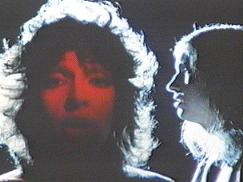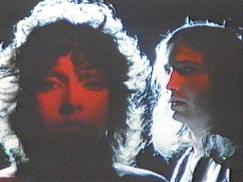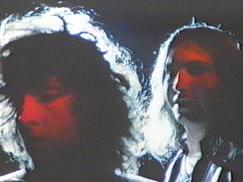The Power Of Rock 'n Roll
Gallery Magazine
By midnight, hundreds of monsters line the street outside New York City's Waverly Theatre. There, every Friday and Saturday, the Rocky Horror Picture Show--a 1974 spoof of Fifties horror films--is the occasion for a cult ritual of costumes, dances, screams, and songs by its fanatical following. And invariably, many in the crowd are made up to look like Eddie, the leather- jacketed delivery boy who, having lost half his brain to Dr. Frank-N-Furter's knife, comes thawed and roaring out of the gothic castle's freezer on a motorcycle, singing, "Whatever Happened to Saturday Night?"

Underneath the bizarre makeup is Meat Loaf, a huge, hulking Texan who played the part in the stage version, too, but who has collected quite a few more impressive theatrical credits. He also has one of the most powerful, moving voices to be heard in the Seventies, and these days, Meat Loaf's "Saturday Night" isn't a horror show, but a high school collage of sexual frustration, fulfillment, and fantasy.
Meat Loaf recently toured the country with Bat Out Of Hell (Epic/Cleveland International), a debut album produced by Todd Rundgren with music by Jim Steinman. One of the songs, "Paradise by the Dashboard Light," soon became an FM cult favorite itself--a rock'n'roll duet detailing the frantic groupings of a couple in a parked car. Ellen Foley, who made a brief TV appearance on the short-lived variety show, "3-Girls-3," sings the girl's protests and passion on record; Karla de Vito is Meat Loaf's match onstage; and Steinman, whose fantasies forged the album, leads the band through the riveting Bat Out Of Hell rock opera.
Meat Loaf is 30, Steinman 27, and contrary to physical appearances, it was Jim who proved to be the big eater one afternoon in a New York Chinese restaurant. "He's known for his huge orders," Meat Loaf told Gallery's Susan Toepfer after Steinman picked everything from columns A and B, and most of C, as well. "I'm just a promiscuous eater," the songwriter countered. "I can't establish a long-term relationship with any one food. It's the gastro version of Looking For Mr. Goodbar. I pick all these foods, and eventually they turn on me."
GALLERY: At least in New York Rocky Horror Picture Show has a very strong, strange, and devoted following. Was it that popular when it was released?
MEAT LOAF: No, it was not a hit when it came out. It's just a huge cult movie. Almost every city we've played so far, it's in and sells out.
GALLERY: Are you recognized on the street?
MEAT LOAF: No, because I look completely different in the movie. I wear a black wig and a lot of heavy makeup, so I look like I have a beard to match the hair.
GALLERY: What did you do before the film?
MEAT LOAF: I played Amiens in "As You Like It" in Shakespeare in the Park and also worked the Shakespeare festival in a play that Steinman wrote called "More Than You Deserve." That's where we met, about five years ago. I also worked at Cafe' La Mama. And my last encounter with the theater was a play called, "Rockabye Hamlet."
GALLERY: That never got off the ground, did it?
MEAT LOAF: Worse than that. It was the most horrifying experience of my entire life. I was doing the second "National Lampoon" show at the time, the one with Gilda Radner and John Belushi. Steinman was the musical director. I got out of that and into "Rockabye Hamlet" and didn't like it. About three weeks into rehearsal, I tried to get out, and after a little meeting with the producers, they called in Gower Champion, who said, "How dare you want to leave a Gower Champion show?" They wouldn't let me out, and since I was under control, I had to stay until the whole thing gave way.
GALLERY: When did you come to New York?
MEAT LOAF: In 1970, from Los Angeles. Right of the plane and into "Hair."
GALLERY: Did you take off your clothes?
MEAT LOAF: No.
GALLERY: Were you the only one?
MEAT LOAF: No. There were thousands of people who wouldn't. Hardly anybody would take off his clothes, in fact. It got to the point where they were paying 'em $17.50 a shot to do it. Seventeen-fifty to peel. The nude scene in "Hair"--what a hype. It lasted about four seconds. The stage was almost totally dark, and they had these revolving lights, which meant you couldn't see anything. Just shadows. It was banned in some cities because of the nude scene, the language, so it made a fortune. It was great because it got lousy reviews when it opened on Broadway. I did it originally in Los Angeles.
GALLERY: When did you move there?

MEAT LOAF: After I dropped out of Texas Tech. I went from Dallas to L.A. to form a rock'n'roll band called Popcorn Blizzard. In the late Sixties we opened for Ted Nugent, the MC5, the Fugs, Edgar Winter, Johnny Winter, the Grateful Dead, Dr. John, the New York Rock and Roll Ensemble. All the big concerts that followed Woodstock.
GALLERY: And you just sang?
MEAT LOAF: Yeah, and I was terrible. I started the band becase I didn't have anything else to do, and I didn't want to get a job. One summer, during college, I was an efficiency expert at a place where they made these huge water and oil vessels. I had to stand there, seventeen years old, and supervise people who had been doing this all their lives. They hated me--until I got to pitch for their softball team. Then they liked me. I still like to play softball and have had a team ever since I can remember. Now I play with the Broadway Show League.
GALLERY: What did you want to do when you were a kid?
MEAT LOAF: Play football. I didn't know anything else.
GALLERY: How did your parents feel about that?
MEAT LOAF: Oh, being in Texas and being as big as I am, it was natural. Although I'll say my ability as a football player wasn't as great as a lot of others'. I was just mean, ornery. They'd make me mad before every game. And football in Texas, especially high school football, is a big thing. There'll be maybe 30,000 people turning out for a high school game. Or a junior high school game. It's enormous.
GALLERY: I guess so. They have all those cheerleaders.
STEINMAN: That's why they have football, to take care of the cheerleaders. There was this huge surplus of cheerleaders, so they had to create something for them.
GALLERY: I've been told the name Meat Loaf comes from those football days.
MEAT LOAF: Yeah, it's a nickname I got around 1961. My own name is boring. I was never called by my real name, because in the South they call people by their intials a lot, and mine are M.L. But when I introduced myself as "M.L.," they'd always call me "Mel." So later I stuck with Meat Loaf. Another name I had was "Mighty Large," and when I was playing football, my legs were so huge, they called me "Tree Trunks."
GALLERY: Is Meat Loaf your legal name now? Is that how you sign your checks?
MEAT LOAF: I have two names, but I never tell my real one. And I do have a credit card with Meat Loaf on it. Some people call me "Meat," and when I'm reviewed, I'm sometimes "Mr. Loaf."
GALLERY: Did you have a good time in high school?
MEAT LOAF: Yeah. You know football players; they have good times. But my team was different from most. We broke a lot of rules. We trained on enchiladas when we were supposed to be eating roast beef. People would get sick; the coach wouldn't understand. The team, needless to say, didn't win any championships.
GALLERY: You started singing in church. Was that important to you?

MEAT LOAF: My grandfather was a Church of Christ minister. Church of Christ is real close to Baptist, the only difference being that we had no instrumental music, in other words, an organ. There's a quote in the Bible about "making music in your hearts." They took that to mean singing.
GALLERY: Did you enjoy that?
MEAT LOAF: Yeah. And I sang in the choir, too, but that was just so I wouldn't have to sit in study hall. I didn't really sing there, just mouthed the words.
GALLERY: When did you get interested in acting?
MEAT LOAF: That's a real bizarre story. I was drunk one night with my best friend, and he told me they were having auditions for this high school musical and that I should go. I said okay, even though I'd been just mouthing the words in choir all along. I went in and sang out of tune, and the next day it was announced over the loudspeaker that I'd gotten the part. I was immediately called into the baseball coach's office. He was furious and told me, "You cannot be an athlete and do these sissy things." So that made me mad. I wasn't going to do the musical, but that made me change my mind. And I really got into it, had a lot of fun with it, but I still wanted to play football.
GALLERY: When did the football stop?
MEAT LOAF: In college, when I got hurt and couldn't play anymore. I had eleven concussions, and I still wanted to play, but they wouldn't let me.
GALLERY: How did the Bat Out Of Hell album come together?
MEAT LOAF: It started with this sort of Peter Pan musical Jim had written called "Neverland." I freaked out one day. He had to make a decision about whether he was going to do that play or we were going to start the album.
GALLERY: It's a concept album of sorts, with all the images focusing on a kind of Fifties high school world.
STEINMAN: Well, high school. I wouldn't ever think of it as especially Fifties. If you're in high school now, it's the same. And for the Eighties, I'm optimistic about a return to a certain kind of innocent power. Conceptually, I'd describe it as a combination of romantic violence and violent romance. When I was growing up, the greatest rock'n'roll sort of existed at that cross-roads, where romance became violent and violence became romantic.
GALLERY: In the early Sixties?
STEINMAN: Well, there's always been that element, whether you go back to Elvis in the Fifties or the Ronettes in the early Sixties or Del Shannon through the Stones. It only stopped for me, really, in the early Seventies, when the music got real bland, tranquilizing. But that's what used to get to me, that romance that was so passionate it was violent, so that it existed as thrill and action. Which is perfect for rock'n'roll because there's nothing adult about it, no more responsibility to it. It's antithetical to the kind of music Paul Simon writes. He writes about the responsibility of relationships, and it's no longer romance, violence, but meaningful relationships, which are hard to place in the same context as rock'n'roll.
The same thing happens when the violence becomes so romantic that it ceases to be damaging. That's where the real fun in rock'n'roll was to me, and I don't hear any of that in the Seventies. So in a way, a lot of the Bat Out Of Hell songs were written just because I really wanted to hear songs like that, and the only person in the last few years who could thrill me was Bruce Springsteen.
GALLERY: Well, there are critics who say that everything you do comes straight from Springsteen.
STEINMAN: I find that puzzling, musically, although there are a few things. We come from the same influences. One of my favorite songs of all time is Del Shannon's "Runaway," and that's a real influence on Springsteen. Phil Spector, the early Sixties, that's where the influence comes from. Springsteen was more an inspiration than an influence. But the main difference between us is that his songs are much more realistic and street-oriented, whereas mine are much more mythic and fantastic.
GALLERY: You're also relying on a very adept, calculated use of clichés.
STEINMAN: My lyrics are a lot more self-conscious, and yeah, I love clichés.
MEAT LOAF: Also, we use Max Weinberg and Roy Bittan, his drummer and keyboard player. Max, because he happens to be a great drummer, and Roy, because he and Jim have very similar styles of piano playing. Roy's a little smoother, but the styles are similar, and Jim decided not to play piano on the album. He just did a couple of piano overdubs and some lascivious sounds on "Paradise By The Dashboard Light."
STEINMAN: You can't hear it on the album, but I'm doing a lot of Donna Summer moaning. Essentially, I just made out with myself. First I recorded the boy, then the girl's groans. It was all very hesitant, trembling.
MEAT LOAF: If you could only hear it, it would be the best part of the album. When Jim was recording, Todd was laughing so hard he was crying. By the time he got to the girl, Todd was biting the console.
GALLERY: I wish I could hear it. But one thing I really liked about the album is its operatic quality.
STEINMAN: I wanted it to be majestic. When I grew up, I wanted to be an opera singer. I grew up listening to opera and rock'n'roll. I had an operation on my nose, so I can't really sing now. But I love that point, too, where rock'n'roll becomes operatic. Phil Spector developed it to a fine point. I still get chills listening to those records. The music that influenced me most was The Who, Spector, and the Beach Boys. "God Only Knows." "Wouldn't It Be Nice." Their sound is what America is to me.